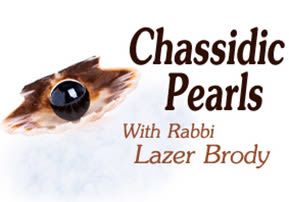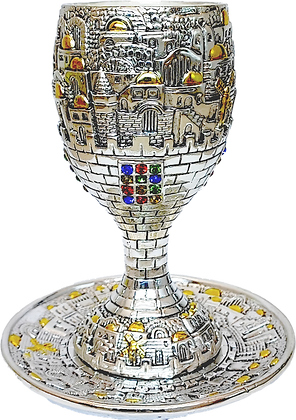
Kedoshim: Every Jew’s Special Quality
At a superficial glance, the Torah's commandment that we love our neighbor as we love ourselves seems peculiar and...

"And you shall love your neighbor as yourself" (Vayikra 19:21).
At a superficial glance, the Torah's commandment that we love our neighbor as we love ourselves seems peculiar and virtually impossible. How can a Jew from Yemen be expected to love a Jew from Belgium, when the two have so completely different customs, mentalities, and attitudes? How can a "Chossid" love a "Litvak" when the two have been arguing for centuries already about the proper way to serve HaShem? How can a religious Jew love a secular Jew when the two differ on so many basic issues?
An examination of Rebbe Nachman's teachings provides a clear and simple answer to the above questions: In Likutei Moharan I:34d, Rebbe Nachman writes that each Jew possesses a special quality that others lack. One Jew's special quality is capable of arousing other Jews, as well as illuminating their hearts in the service of HaShem. As such, Jews are dependant on one another for serious spiritual gain.
Here's how the above principle works in practical terms: Suppose that one person has tremendous patience and powers of concentration, and is capable of learning Gemorra for hours on end. This person meets a charitable individual, who may not have so much patience, but is a dynamo of good deeds and loving kindness. When the first person sees the tremendous charitable acts of the second person, his heart breaks, and he says to himself, "I'm not doing nearly enough of what I should be doing in charitable deeds. I need to improve in this area!" As such, the first person improves the chessed (charitable) side of his service to HaShem – acts of charity and loving kindness – as a result of the second person's influence and example.
Alternatively, the second person – having met a serious scholar who perseveres tirelessly in his learning – says to himself: "I'm not learning nearly enough Torah as I should! Look how my friend learns for four hours straight without getting up from his chair. I need to become much more serious in my learning!" The second person in turn strengthens his own service of HaShem from the shining example of the first person.
A beautifully dynamic upward spiral results from the above relationship – each person reflects his own special quality on his friend, to the mutual benefit of both people. Now, the learner has become more charitable and the charitable person has become a better learner. Both are now closer to HaShem and better Jews! Their hearts feel how they've helped one another, and so they are capable of truly fulfilling the commandment of loving their neighbor as they love themselves. With HaShem's loving guidance, the following parable will help us understand Rebbe Nachman's above-mentioned principle even better.
* * *
The Ukrainian winter was a bitter one. The snows didn't melt until Pesach, and even then the roads were a barely-negotiable muddy mess of potholes. The annual May Farmer's Bazaar in Berditchev attracted a third of its customary participants.
The merchants were especially gloomy. Yankele, a tall strapping livestock dealer from Zhitomer, sold draft horses. Every time he tried to interest a prospective customer in one of his steeds, the customer would back off and shrug his shoulders saying, "What good is your horse to me if I can't afford a harness and wagon?"
On the other side of the market, Yoshke sat on a wooden crate in front of his pile of harnesses and twiddled his thumbs; he hadn't made a single sale all day long.
Across the street under an open shed, Feivel exhibited his five new sturdy wagons, guaranteed to last! Not as single person interrupted his recitation of Tehillim to inquire about the price of a wagon.
Later in the day, the merchants gathered in the local shtiebel (Chassidic synagogue) for afternoon prayers. After the davening, they filed out and began returning to their respective stalls. Feivel, Yoshke, and Yankele struck up a conversation; each sang his respective woeful song of no customers and no income.
Suddenly, a wonderful idea illuminated Yankele's brain: "Say, why don't I bind one of my best horses to one of your highest-quality harnesses, Yoshke, and then hook it up to Feivel's best wagon. We'll display the whole thing in the center of the bazaar, and see what happens. Would you like to try such a partnership?" The other two readily agreed, blessing HaShem and their colleague Yankele for the wonderful idea.
In short, the harnessed horse and wagon brought almost twice the price of each component sold alone, to the satisfaction and gratification of all three merchants. By the end of the week, they sold another four horse-drawn wagons. Each returned home with a better profit than he ever earned, with a new partnership, and more than anything, with two new friendships.
* * *
Just as each merchant came into the partnership with his respective wares, and combined individual parts to make an effective and attractive whole, each Jew brings his own special quality into a friendship and relationship with a fellow Jew. So, the more one truly loves other Jews, the more one gains from each person's special quality that no one else has. Consequently, the more one loves his fellow Jews of all types and backgrounds, the more one becomes a better person and servant of Hashem. By virtue of our enhanced love for our neighbor, may we merit to see the coming of the Moshiach and the ingathering of our exiled brethren from the four corners of the earth speedily and in our days. Amen!











Tell us what you think!
Thank you for your comment!
It will be published after approval by the Editor.